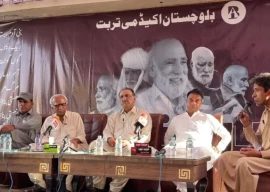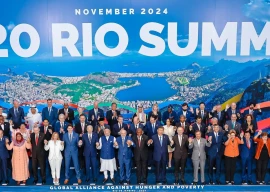Inequality in Pakistan is deep-rooted and structural, said eminent economist Dr Kaiser Bengali during the launch of the report, ‘Reward Work, Not Wealth’ by the global charity Oxfam, in Rawalpindi on Monday. The report reveals how the global economy enables the wealthy elite to accumulate vast fortunes while billions of people are struggling to survive on poverty pay.
Elaborating on lop-sided growth in the country, Dr Bengali said that some individuals have thousands of acres of land but thousands of people in the same vicinity have no landholdings at all.
“Monthly tuition fee of a student enrolled in an elite school is three times more than the salary of same school’s security guard,” the renowned economist said painting a stark picture of the distribution of wealth in Pakistan.
Organised by Oxfam in collaboration with Pir Mehar Ali Shah Arid Agriculture University Rawalpindi (PMAS-AAUR) and Indus Consortium, the launch was held in a public policy forum at the varsity.
Dr Bengali said that the richest 10 per cent of Pakistanis pay only 12 per cent of their income in taxes while the poorest end up giving as much as 16 per cent of their incomes in taxes.
“We see economic growth in stats released by the state institutions. What we do not see is that growth is not creating jobs,” he said.
Launched in the wake of World Economic Forum in Davos, Switzerland, the Oxfam report says that the richest one per cent bagged 82 per cent of wealth created last year while the poorest half of humanity got one per cent only.
At the close of the 20th century, the presumption was that greater economic interdependence among countries, buttressed by liberal democratic institutions, would ensure peace and stability well into the new century
However, 3.7 billion people who make up the poorest half of the world saw no increase in their wealth, according to the report.
Better wages
Oxfam Country Director Mohammed Qazilbash said: “We do not have authenticated data to measure the actual level of income and wealth inequality in Pakistan and how in recent years the fortunes of rich have increased. One of the major reasons for rising disparity in Pakistan is lower wages of workers and infringement of labour rights.”
Minimum wage in Pakistan is a fraction of the living wage on which a family of four can live a decent life in urban centres, which is also not implemented.
Gender inequality
According to Oxfam’s report, women workers often find themselves at the bottom of the heap. Across the world, women consistently earn less than men. By comparison, nine out of 10 billionaires are men.
“Pervasive gender inequality manifested in different dimensions in Pakistan, which means that women’s work is devalued and they end up working in low-paid jobs and bear the undue burden of unpaid care work. Around 87 per cent of female employees in Pakistan earned less than minimum wage,” Qazilbash elaborated.
Dr Nadia Tahir said that awareness and education come later, first consider women humans. Count them properly in the census. “Not only wage inequality between genders is one of the worst in Pakistan but our maternal mortality rate is also highest in South Asia. Landholdings of women are less than one per cent. We need policies and actions to reduce this gender inequality if ending it altogether is not possible in the near future,” demanded Dr Tahir.
Education
PMAS-AAUR Vice chancellor Prof Sarwat Naz Mirza said that country spends a measly two per cent of GDP on education.
“Inequality cannot be reduced unless we increase this spending to at least four per cent. Students from rural areas of Pakistan can’t compete with urban students due to lack of opportunities and low-income levels,” emphasised Dr Mirza.
While highlighting the recommendations of the report, Oxfam’s Mustafa Talpur told that the structure of economy needs to be addressed first up. “We recommend to the government to regularise, restructure and redesign our economy and the way business is run. Set concrete and time-bound targets and action plans. And tackle all forms of gender inequality,” Talpur elaborated.
The report outlines the key factors driving up rewards for shareholders and corporate bosses at the expense of workers’ pay and conditions. These include the erosion of workers’ rights; the excessive influence of big business over government policy-making; and the relentless corporate drive to minimise costs in order to maximise returns to shareholders. Oxfam is calling for governments to ensure a curb on tax avoidance, and increase spending on public services such as healthcare and education.
Published in The Express Tribune, January 23rd, 2018.

















COMMENTS
Comments are moderated and generally will be posted if they are on-topic and not abusive.
For more information, please see our Comments FAQ